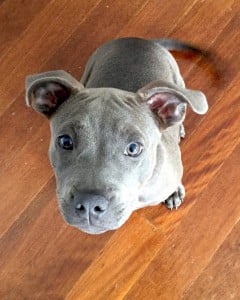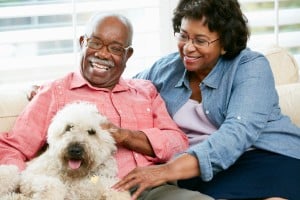Anyone with a new pup would have to agree that there are a million things they love about their little cute ball of wrinkly skin and puppy breath! However, I’m pretty sure that cleaning up ‘accidents’ in the house are not favourite activities….
Before we get into the ‘How To’s” there are a couple of factors to consider:
- Some pups learn faster than others. Just because your aunty’s best friend’s puppy learnt to toilet outside by the time it was 7.5 weeks old, does not mean that there’s something wrong with your 16 week old that still has an occasional accident. Puppies can be up to 6 months old before they’re toilet trained.
- Puppies are easily distracted. Your pup may be heading to the loo, get distracted by a ball-game and suddenly find he needs to do a wee and can’t hold on long enough to get outside.
- You may forget to take your pup out at the required times.
- The toileting area may not always be easily accessible to your pup. Do you have a doggie door and does your puppy know how to use it?
So, what can you do to put your pup on the best path to being toilet trained?
- Choose an area of the garden that you would like your pup to use as a toileting spot.
- Help him learn to go to the loo outside in that spot by putting him out in that spot at the most likely times that he’ll need to go i.e. as soon as you wake-up in the morning; after he’s had a drink of water or after a meal; after waking up from a snooze; when you get home; every 1-2 hours in between those times.
- When outside at the toileting spot, ignore any of his attempts to play. Sometimes it helps to have your puppy on a lead so he doesn’t get distracted and go running around the garden chasing butterflies and forgetting to ‘do his business’. Whilst on the lead, allow him to sniff around but try to guide him to stay in the toileting area.
- Reward him immediately after the deed is done – this means saying ‘Good Dog!’ in a happy upbeat tone, but be careful not to distract your pup while he’s still trying to finish up.
- Once he’s repeatedly going out and toileting in the toilet spot, you can start adding a cue like ‘Toilet’ or ‘Splash your boots!’ when you take your pup out onto the grass. Repeat the cue every time he’s out to toilet and once he’s grown and well practiced, all you’ll need to do is give him the cue and he’ll run and do the deed!
If your pup has an accident indoors:
- If you catch your pup in the act, quickly and quietly get him out onto the grass in the loo spot and repeat the cue.
- Clean up messes straight away using a cleaner produced specifically for removing urine and faeces smells, or mild soap and water.
What NOT to do:
- DO NOT: Yell at or smack your pup if he messes inside. That behaviour will only scare and intimidate your pup. In turn, this may lead to him hiding when doing a wee or poo and then you may start finding hidden ‘presents’. Puppies do not mess inside ‘on purpose’, nor do they get a ‘guilty look’. They do however learn to read human body language very well, can see when you get really angry and will respond with submissive behaviours, that you could wrongfully interpret as a guilty look. Your puppy will not understand that you are upset because he’s messed inside, he’ll just think that you get mad when he does a wee or a poo – which when thinking about it from a puppy’s perspective, is absurd since this is a normal body function. We all know: “You’ve gotta go when you’ve gotta go!”
- DO NOT: Rub your pup’s nose in the poop. As before, he won’t learn where you want him to go to the loo, but rather that sometimes & inexplicably you get REALLY angry and rub his face in excrement. Spend less energy on an ineffective scare tactic and more effort on training him where you do want him to toilet and praise him for a job well done!
- DO NOT: Use ammonia based cleaners for cleaning up messes. To dogs and cats, ammonia-based cleaners smell like urine, and will only encourage more toileting in the area. There are special cleaners (e.g. Urine-Off) that contain enzymes that remove the smells effectively and reduce the likelihood of toiling in that spot again. Alternatively, try using a mild cleaner like a dishwashing liquid that will not leave any additional smells behind.
As with learning all new skills, toilet-training needs a lot of patience, a bit of time, consistency and lots of praise when your pup gets it right. If you’re having trouble, need a couple more tips or think there maybe something more than regular toilet-training issues affecting your pup, feel free to call 0481 527 678, email vet@healthypetmobilevet.com.au or request an appointment online. We’ll be happy to help!


